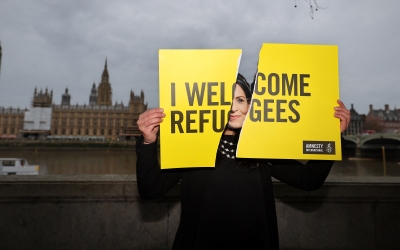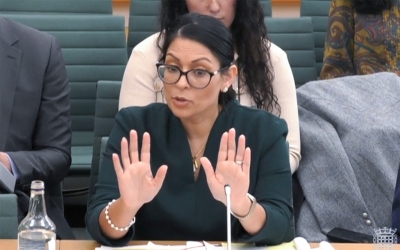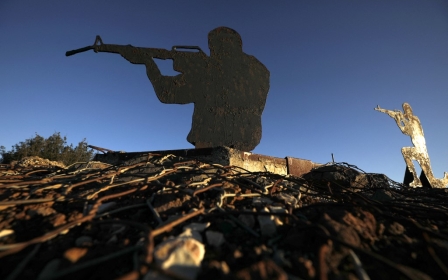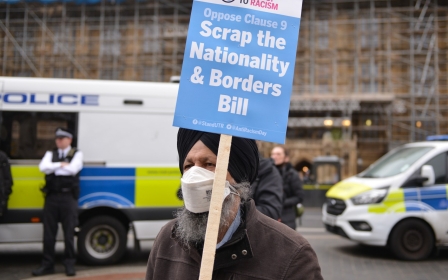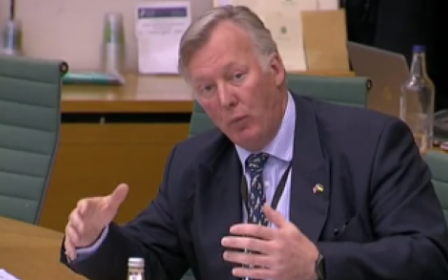UK policy to send asylum seekers to Rwanda criticised as 'cruel'
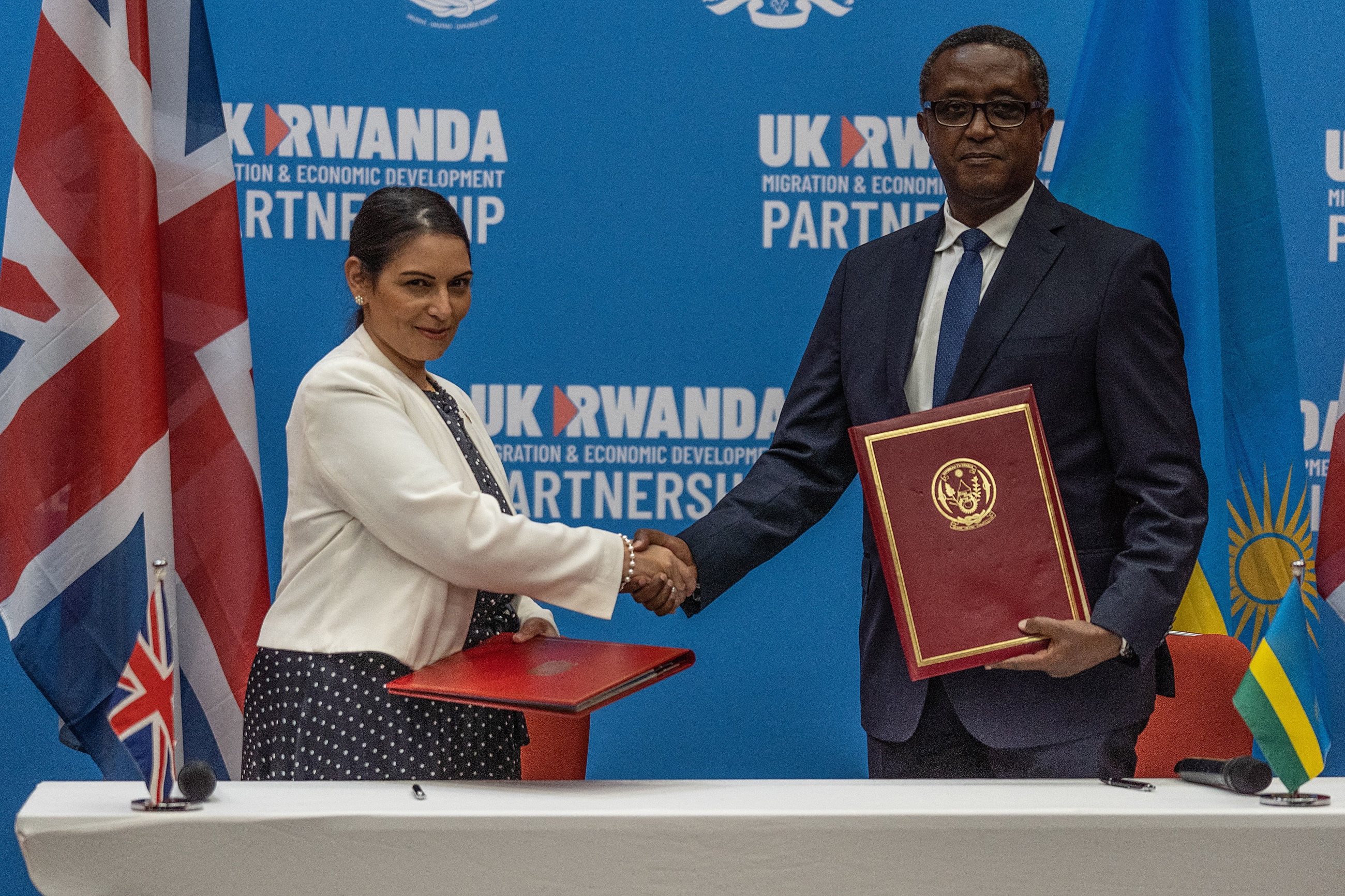
A new UK government policy to send asylum seekers to Rwanda has been roundly condemned by refugee and human rights groups and will have a significant impact on those fleeing persecution from the Middle East and North Africa.
Prime Minister Boris Johnson announced on Thursday that some asylum seekers would now be processed in the African country.
“Anyone entering the UK illegally as well as those who have arrived illegally since January 1 may now be relocated to Rwanda,” he said during a press conference in Kent.
“We cannot sustain a parallel illegal system. Our compassion may be infinite, but our capacity to help people is not.”
He added that the risk posed to those crossing the channel of potentially ending up in Rwanda instead of the UK would “over time prove a very considerable deterrent”.
New MEE newsletter: Jerusalem Dispatch
Sign up to get the latest insights and analysis on Israel-Palestine, alongside Turkey Unpacked and other MEE newsletters
Home Secretary Priti Patel landed in the Rwandan capital Kigali on Thursday to unveil the new “migration and economic development partnership”.
The deal will reportedly cost an initial £120m ($157m), but critics have stated the total cost will be much higher.
It will also see single men arriving in the UK in boats and lorries have their asylum claims processed in the African country, and be encouraged to settle there.
Iran, Iraq and Syria among most impacted
In 2021, Middle East and North Africa countries made up 11 of the top 20 countries for those who came to the UK via small boats, according to data from the Home Office.
Iran was the highest with 7,874 arrivals, followed by Iraq with 5,414. Syria came in fourth.
An analysis by the Refugee Council in November found that most people arriving in the UK in small boats were likely to be fleeing persecution.
It said that 91 percent of people came from just 10 countries where human rights abuse was common - including Syria, Iraq, Sudan, and Yemen.
The report showed that the vast majority of those arriving from these countries were likely to be granted refugee protection - countering the narrative, often peddled by the UK government, that those crossing the Channel were not in genuine need of protection.
“There is a deliberate attempt to paint people seeking asylum as jumping the queue,” Enver Solomon, CEO of the Refugee Council, told Middle East Eye in a statement.
“Yet this ignores the fact that the Government’s own data shows that two-thirds of men, women and children arriving in small boats across the channel come from countries where war and persecution have forced them from their homes.
With so few safe and legal routes available, these people are left with no other option than to risk their lives in small boats at the hands of smugglers in desperation to find safety.”
He added that the proposal treated refugees differently based on how they arrived in the UK, which “undermines a key principle of refugee protection”.
Rwanda human rights concerns
In his press conference, Johnson described Rwanda as “one of the safest countries in the world, globally recognised for its record of welcoming and integrating migrants”.
But many were quick to point out the country’s poor human rights record - something the UK government itself noted last year.
In July, the UK’s ambassador for human rights said she regretted that Rwanda did not support recommendations “to conduct transparent, credible and independent investigations into allegations of human rights violations including deaths in custody and torture”.
Rwandan authorities, under the leadership of longtime ruler Paul Kagame, have been accused of violently targeting its critics.
It has been accused of carrying out enforced disappearances, arbitrary detentions - including in unofficial detention facilities - and failing to investigate the suspicious deaths of government opponents.
The country’s human rights record raises serious questions about its suitability for asylum seekers who are themselves fleeing persecution and abuse.
“Banishing people to Rwanda, which has an appalling human rights record, is the same as the UK tearing up its commitment to give people who need asylum sanctuary,” Steve Valdez-Symonds, Amnesty International UK’s refugee and migrant rights director, told Middle East Eye.
Paul Rusesabagina, whose role in saving people during the 1994 genocide was portrayed by Don Cheadle in the film Hotel Rwanda, was last year convicted to 25 years in prison on terrorism charges. He was reportedly tricked into taking a flight to Kigali and coerced into making a confession.
Earlier this week, the US State Department published its annual human rights report by country, in which it outlined several "significant human rights issues" in Rwanda.
“Treating people like human cargo by using the force of military to repel vulnerable people who have already endured extreme human suffering and expelling them to centres in Rwanda, a country with a questionable record on human rights, is dangerous, cruel and inhumane,” Solomon said.
Australia and Israel
The policy to send asylum seekers to be processed abroad is part of the controversial nationality and borders bill, which has not yet become a statute after facing pushback in the House of Lords.
The Rwanda policy may yet face further legal challenges, given that the UK is a signatory to the UN Refugee Convention and the European Convention on Human Rights - both of which prohibit refugees from being subjected to ill-treatment.
Australia has utilised offshore asylum processing in Papua New Guinea and Nauru over the past decade, in a policy that was described by rights groups as cruel and costly.
A similar deal to the UK's new policy was also struck between Rwanda and Israel between 2014 and 2017, but it resulted in most of 4,000 asylum seekers reportedly leaving the African country soon after arrival.
“Not only is this a fundamental repudiation of obligations the UK shares with other countries to provide asylum, but this so-called partnership is a dismal repeat of an abandoned deal struck by Israel when it ‘persuaded’ people seeking asylum to relocate to Rwanda,” Valdez-Symonds said.
“Instead of safety, they faced abuse, trafficking, starvation and threats of being returned to countries they were fleeing from torture.”
Middle East Eye delivers independent and unrivalled coverage and analysis of the Middle East, North Africa and beyond. To learn more about republishing this content and the associated fees, please fill out this form. More about MEE can be found here.


